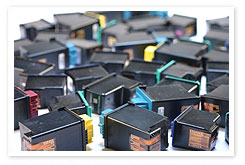Recycle office waste

Sophisticated products assist us with our daily work, from printer cartridges and toners through to the specialist components used to manufacture and process our products and foods. To get these products we have concentrated, extracted and combined raw natural elements into new and unique elements such as plastics, aluminium, mercury, acids and so on.
Recently we have realised that to use these resources efficiently and avoid them spoiling the environment, we need to create closed loops that allow us to move these technical materials from one use to another in the same way nature cycles nutrients, water or energy throughout its ecosystems.
Recycling your office waste will stop toxins entering our environment, facilitate the reuse of elaborate components (ie printer cartridges and toners), reduce the amount of land dedicated to landfill and move us toward a closed loop where all waste is recycled.
How to do it now!
Purchase recycled products. To complete the recycling loop we need to purchase recycled products. See our Purchase recycled goods action.
Establish a recycling program at work. If your office doesn't have a paper recycling program in place follow these steps to create one:
- Talk to your manager (or the office manager, the owner, or whoever can make it happen) about implementing a recycling program at your work.
- Do some research on establishing a successful paper recycling program. There are several sites that offer assistance, guides and support for establishing a paper recycling program. Here are some to get you thinking:
- Recycle Near You (NSW) - Provides a great PDF guide to setting up and running a paper recycling program.
- Zero Waste (SA) - Offers a directory of recycling services in SA.
- Queensland Waste Management (QLD).
- Waste Management (WA).
- Planet Ark 'Recycling near you' - Provides a great directory of recycling services.
Recycle paper. A large component of office waste is paper; reams of paper go into landfill every day. See our Save Paper, Trees and Forests action.
Recycle or refill your toner and ink cartridges. Recycling or refilling these items is as simple as finding a local 'remanufacturer' and asking them to provide collection bins and collection services to your workplace.
Collect and recycle batteries. Get a battery recycling box for your office. For details about battery recyclers
- Contact your local council about a collection service.
- Refer to the Yellow Pages under the heading "batteries".
- Mobile phone batteries can be returned to mobile phone outlets.
Recycle your mobile phones. For every mobile phone in use, there are two more sitting unused in a draw somewhere! Mobile phones contain nickel, cobalt, cadmium, gold, silver and plastics which can be recycled and reused. Most mobile phone retailers have recycling boxes. Alternatively, call MobileMuster for a full list of drop-off locations or to organise a recycling box for your workplace.
Recycle compact fluorescent globes. The new efficient light globes are great, however they contain small amounts of mercury and need to be disposed of in a way that prevents this mercury entering nature, our soil and food.
The Australian Government in partnership with the lighting industry has developed and launched Fluoro-cycle, a scheme aimed to increase recycling rates for mercury-containing globes.
Visit the Department of Sustainability, Environment, Water, Population and Communities pages for more information on the Fluoro-cycle and recycling of light globes.
In addition, fluorescent globe processing is carried out in Australia through recycling companies such as Chemsal and CMA Ecocycle.
Separate and recycle glass, plastic and paper. Establish separate bins for recycling glass, plastic bottles and cardboard to make it easy for your waste collector / recycler to process your different types of office waste.
Recycle organic waste. Organic office kitchen waste can be fed to an onsite worm farm or put in a compost bin. See our Recycle organic waste action.
Why is this action important?
In order to reduce the strain our ongoing consumption is putting on the environment, we need to use less and use it many times (ideally, perpetually). Creating closed loops by recycling all that we can moves us in this direction.
